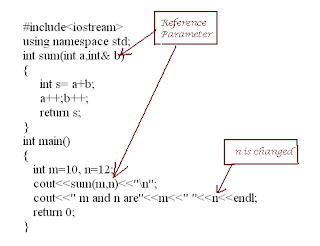Know your operators
You know basic operators of any programming language. You know very well that x is not multiplication, but * is. You also know that % does not give percentage, instead gives reminder. You also know about && || and !
But that is just basic stuff or as the cliche goes tip of the iceberg. C has a very rich set of operators. And these allow you to write very small and cryptic programs.
Here m will be 6 and n will be 4.
But if we use post increment operator
Same rules apply to decrement operators --.
Equal to operator is not =.
= is assignment operator. Equal to is ==. And not equal to is !=.
But that is just basic stuff or as the cliche goes tip of the iceberg. C has a very rich set of operators. And these allow you to write very small and cryptic programs.
a++ or ++a?
You know about increment operators - pre-increment and post increment. You can increment your number a using ++a or a++. Which is better and why?
The answer is - it does not matter. Both increment the number - an integer. Please remember that you can not increment a float or a double. But you can increment a char - because char is basically an integer.
So you use a++; or ++a;
But it matters when this iincrement operation is used in an expression.
Let us look at an example.
int m = 2, n=3;
m = 2 + ++n; Here m will be 6 and n will be 4.
But if we use post increment operator
int m = 2, n=3;
m = 2 + n++;Same rules apply to decrement operators --.
What is sum+=n?
You use this type of expression quite often.
sum = sum+n;
So, C has a short hand operator for this called +=
sum+=n;
is same as sum = sum+n;
You have such operators for all arithmetic and bitwise operators. You have -=, *=, /=, %=, <<=,>>=, &=,|=,^=
What is the relation?
Of course, you know about less than, greater than, less than or equal to, greater than or equal to ( <, >, <=, >=). But confusing operators for newbies are equal to and not equal to.Equal to operator is not =.
= is assignment operator. Equal to is ==. And not equal to is !=.
int a = n%2;
if(a==0)
printf("%d is even",n);
else
printf("%d is odd",n);
Three is a crowd
C has only one ternary operator?: . Ternary operator is an operator which takes 3 operands. This operator works like if - else statement.
The second statement is equivalent to
&a gives "address of" a.
int m,n,p; m = 3;n=2;
p = m>n?m:n;
The second statement is equivalent to
if(m>n)
p = m;
else
p = n;
int m;scanf("%d",&m);(m%2)?printf("Odd"):printf("Even);
Where is the address?
You can get the address of a variable using & operator. Please note that, & is also used for bitwise and operation and && is logical and.
int a =0; int *ptr = &a;//& is address operator
ptr = &(a+10)
produces error because a+10 is not lvalue and has no address.
Once we have address, we can get value at that address using * operator - called indirection operator .
int b = *ptr;//indirection operator
b is assigned to the value at address in ptr.
Again the onus is on you to ensure that ptr points to correct location. If ptr is uninitialized or has 0 value or any other invalid value - you get the infamous segmentation fault.
Just a dot
Operator . is used to access member of a structure or a union. -> arrow operator is used to access member of a structure using a pointer.
struct student {int id,char name[10]};
struct student s;
s.id = 10;
strcpy(s.name,"FooBar"}; struct student *sptr = &s; sptr->id=11; And the rest
There are bitwise operators &,|,!, ^ and complement. And there are left and right shift operators. Read about bitwise operators here


Comments
Post a Comment